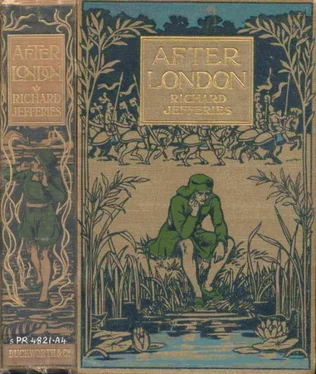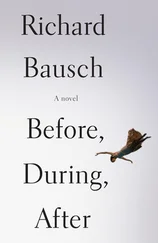Richard Jefferies - After London
Здесь есть возможность читать онлайн «Richard Jefferies - After London» весь текст электронной книги совершенно бесплатно (целиком полную версию без сокращений). В некоторых случаях можно слушать аудио, скачать через торрент в формате fb2 и присутствует краткое содержание. Город: London, Год выпуска: 1905, Издательство: Duckworth & Co., Жанр: sf_postapocalyptic, на английском языке. Описание произведения, (предисловие) а так же отзывы посетителей доступны на портале библиотеки ЛибКат.
- Название:After London
- Автор:
- Издательство:Duckworth & Co.
- Жанр:
- Год:1905
- Город:London
- ISBN:нет данных
- Рейтинг книги:4 / 5. Голосов: 1
-
Избранное:Добавить в избранное
- Отзывы:
-
Ваша оценка:
- 80
- 1
- 2
- 3
- 4
- 5
After London: краткое содержание, описание и аннотация
Предлагаем к чтению аннотацию, описание, краткое содержание или предисловие (зависит от того, что написал сам автор книги «After London»). Если вы не нашли необходимую информацию о книге — напишите в комментариях, мы постараемся отыскать её.
(1885), set in a future in which urban civilization has collapsed after an environmental crisis.” (From
).
This eBook is for the use of anyone anywhere at no cost and with almost no restrictions whatsoever. You may copy it, give it away or re-use it under the terms of the Project Gutenberg License included with this eBook or online at
* * *
After London — читать онлайн бесплатно полную книгу (весь текст) целиком
Ниже представлен текст книги, разбитый по страницам. Система сохранения места последней прочитанной страницы, позволяет с удобством читать онлайн бесплатно книгу «After London», без необходимости каждый раз заново искать на чём Вы остановились. Поставьте закладку, и сможете в любой момент перейти на страницу, на которой закончили чтение.
Интервал:
Закладка:
He was apprehensive lest she should fill, for he now perceived that he had forgotten to provide anything with which to bale her out. Something is always forgotten. Having got the sail down (lest the wind should snap the mast), he tried hard to force the canoe back with his longer paddle, used as a movable rudder. His weight and the resistance of the adhesive mud, on which she had driven with much force was too great; he could not shove her off. When he pushed, the paddle sank into the soft bottom, and gave him nothing to press against. After struggling for some time, he paused, beginning to fear that his voyage had already reached an end.
A minute’s thought, more potent than the strength of ten men, showed him that the canoe required lightening. There was no cargo to throw overboard, nor ballast. He was the only weight. He immediately undressed, and let himself overboard at the prow, retaining hold of the stem. His feet sank deep into the ooze; he felt as if, had he let go, he should have gradually gone down into this quicksand of fine mud. By rapidly moving his feet he managed, however, to push the canoe; she rose considerably so soon as he was out of her, and, although he had hold of the prow, still his body was lighter in the water. Pushing, struggling, and pressing forward, he, by sheer impact, as it were, for his feet found no hold in the mud, forced her back by slow degrees.
The blows of the waves drove her forward almost as much as he pushed her back. Still, in time, and when his strength was fast decreasing, she did move, and he had the satisfaction of feeling the water deeper beneath him. But when he endeavoured to pull himself into the canoe over the prow, directly his motive power ceased, the waves undid the advance he had achieved, and he had to resume his labour. This time, thinking again, before he attempted to get into the canoe he turned her sideways to the wind, with the outrigger to leeward. When her sharp prow and rounded keel struck the mud-bank end on she ran easily along it. But, turned sideways, her length found more resistance, and though the waves sent her some way upon it, she soon came to a standstill. He clambered in as quickly as he could (it is not easy to get into a boat out of the water, the body feels so heavy), and, taking the paddle, without waiting to dress, worked away from the spot.
Not till he had got some quarter of a mile back towards the mainland did he pause to dry himself and resume part of his clothing; the canoe being still partly full of water, it was no use to put on all. Resting awhile after his severe exertions, he looked back, and now supposed, from the colour of the water and the general indications, that these shallows extended a long distance, surrounding the islands at the mouth of the channel, so that no vessel could enter or pass out in a direct line, but must steer to the north or south until the obstacle was rounded. Afraid to attempt to land on another island, his only course, as the sun was now going down, was to return to the mainland, which he reached without much trouble, as the current favoured him.
He drew the canoe upon the ground as far as he could. It was not a good place to land, as the bottom was chalk, washed into holes by the waves, and studded with angular flints. As the wind was off the shore it did not matter; if it had blown from the east, his canoe might very likely have been much damaged. The shore was overgrown with hazel to within twenty yards of the water, then the ground rose and was clothed with low ash-trees, whose boughs seemed much stunted by tempest, showing how exposed the spot was to the easterly gales of spring. The south-west wind was shut off by the hills beyond. Felix was so weary that for some time he did nothing save rest upon the ground, which was but scantily covered with grass. An hour’s rest, however, restored him to himself.
He gathered some dry sticks (there were plenty under the ashes), struck his flint against the steel, ignited the tinder, and soon had a fire. It was not necessary for warmth, the June evening was soft and warm, but it was the hunter’s instinct. Upon camping for the night the hunter, unless Bushmen are suspected to be in the neighbourhood, invariably lights a fire, first to cook his supper, and secondly, and often principally, to make the spot his home. The hearth is home, whether there be walls round it or not. Directly there are glowing embers the place is no longer wild, it becomes human. Felix had nothing that needed cooking. He took his cowhide from the canoe and spread it on the ground.
A well-seasoned cowhide is the first possession of every hunter; it keeps him from the damp; and with a second, supported on three short poles stuck in the earth (two crossed at the top in front, forming a fork, and fastened with a thong, the third resting on these), he protects himself from the heaviest rain. This little tent is always built with the back to windward. Felix did not erect a second hide, the evening was so warm and beautiful he did not need it, his cloak would be ample for covering. The fire crackled and blazed at intervals, just far enough from him that he might feel no inconvenience from its heat.
Thrushes sang in the ash wood all around him, the cuckoo called, and the chiff-chaff never ceased for a moment. Before him stretched the expanse of waters; he could even here see over the low islands. In the sky a streak of cloud was tinted by the sunset, slowly becoming paler as the light departed. He reclined in that idle, thoughtless state which succeeds unusual effort, till the deepening shadow and the sinking fire, and the appearance of a star, warned him that the night was really here. Then he arose, threw on more fuel, and fetched his cloak, his chest, and his boar spear from the canoe. The chest he covered with a corner of the hide, wrapped himself in the cloak, bringing it well over his face on account of the dew; then, drawing the lower corners of the hide over his feet and limbs, he stretched himself at full length and fell asleep, with the spear beside him.
There was the possibility of Bushmen, but not much probability. There would be far more danger near the forest path, where they might expect a traveller and watch to waylay him, but they could not tell beforehand where he would rest that night. If any had seen the movements of his canoe, if any lighted upon his bivouac by chance, his fate was certain. He knew this, but trusted to the extreme improbability of Bushmen frequenting a place where there was nothing to plunder. Besides, he had no choice, as he could not reach the islands. If there was risk, it was forgotten in the extremity of his weariness.
CHAPTER XV
SAILING ONWARDS
When Felix awoke, he knew at once by the height of the sun that the morning was far advanced. Throwing off his cloak, he stood up, but immediately crouched down again, for a vessel was passing but a short distance from the shore, and nearly opposite his encampment. She had two masts, and from the flags flying, the numerous bannerets, and the movements of so many men on board, he knew her to be a ship of war. He was anxious that he should not be seen, and regretted that his canoe was so much exposed, for the bush by which he had landed hid it only from one side. As the shore was so bare and open, if they looked that way the men on board would hardly fail to see it, and might even distinguish him. But whether they were too much engaged with their own affairs, or kept a careless look-out, no notice appeared to be taken, no boat was lowered.
He watched the war-ship for nearly an hour before he ventured to move. Her course was to the eastward, inside the fringe of islands. That she was neither Irish nor Welsh he was certain from her build and from her flags; they were too distant for the exact designs upon them to be seen, but near enough for him to know that they were not those displayed by the foreigners. She sailed fast, having the wind nearly aft, which suited her two square sails.
Читать дальшеИнтервал:
Закладка:
Похожие книги на «After London»
Представляем Вашему вниманию похожие книги на «After London» списком для выбора. Мы отобрали схожую по названию и смыслу литературу в надежде предоставить читателям больше вариантов отыскать новые, интересные, ещё непрочитанные произведения.
Обсуждение, отзывы о книге «After London» и просто собственные мнения читателей. Оставьте ваши комментарии, напишите, что Вы думаете о произведении, его смысле или главных героях. Укажите что конкретно понравилось, а что нет, и почему Вы так считаете.












